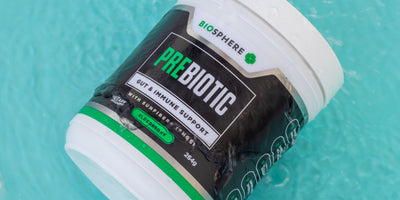
The Role of Prebiotics in Managing Eczema and Other Skin Conditions
Eczema and other skin conditions affect millions of people worldwide, causing discomfort and impacting the quality of life. Recent research has shed light on the potential role of prebiotics in managing these conditions by improving gut health. In this comprehensive article, we will explore the connection between prebiotics, gut health, and skin health, providing valuable insights into how incorporating prebiotics into your diet and skincare routine can benefit those suffering from eczema and other skin conditions.
Introduction to Prebiotics and Skin Health
Prebiotics are non-digestible food components that promote the growth of beneficial bacteria in the gut. Unlike probiotics, which are live bacteria, prebiotics act as food for these good bacteria, helping them flourish. These substances are primarily fibers and compounds that our bodies cannot digest. Instead, they pass through the digestive system and become nourishment for the beneficial bacteria living in our intestines.
The concept of prebiotics was first introduced in the mid-1990s, and since then, research has increasingly highlighted their importance in maintaining a healthy gut microbiome. A balanced gut microbiome is crucial for numerous bodily functions, including digestion, immunity, and even mental health. One of the less commonly discussed benefits of a healthy gut microbiome is its impact on skin health. This connection is part of what is known as the gut-skin axis.
The health of our gut is intrinsically linked to various aspects of our overall health, including our skin. The burgeoning field of research into the gut-skin axis suggests that maintaining a healthy gut can significantly impact skin health. Prebiotics play a pivotal role in this process by fostering a thriving gut microbiome, which in turn can help manage and alleviate skin conditions such as eczema.
Understanding Eczema: Causes and Symptoms
Eczema, also known as atopic dermatitis, is a chronic inflammatory skin condition characterised by red, itchy, and inflamed skin. It can occur anywhere on the body but is most commonly found on the face, hands, feet, and the insides of elbows and knees. The exact cause of eczema is unknown, but it is believed to result from a combination of genetic and environmental factors. Triggers can include allergens, stress, changes in weather, and irritants like soap and detergents.
The symptoms of eczema can vary widely among individuals, but they generally include dry skin, intense itching, red to brownish-gray patches, and small, raised bumps that can leak fluid and crust over when scratched. These symptoms can be persistent and can significantly affect the quality of life, leading to sleep disturbances and increased stress, which can further exacerbate the condition.
Understanding the underlying causes of eczema is crucial for effective management. While genetic predisposition plays a significant role, environmental factors such as diet, stress, and exposure to allergens and irritants also contribute to the condition. Recent studies have highlighted the importance of the skin barrier and the immune system in eczema. A compromised skin barrier allows allergens and irritants to penetrate the skin more easily, triggering an immune response that results in inflammation and itching.
The Gut-Skin Axis: How Gut Health Affects Skin Conditions

The gut-skin axis is a term used to describe the complex relationship between our gut microbiome and skin health. The gut microbiome consists of trillions of microorganisms, including bacteria, fungi, and viruses, that live in our digestive tract. These microorganisms play a crucial role in our immune system, digestion, and overall health. Emerging research suggests that the health of our gut microbiome can significantly impact the health and appearance of our skin.
When the balance of bacteria in the gut is disrupted, it can lead to a condition known as dysbiosis. Dysbiosis has been linked to various health issues, including inflammatory skin conditions like eczema. This imbalance can increase the permeability of the gut lining, a condition often referred to as "leaky gut." When the gut lining becomes more permeable, toxins and partially digested food particles can enter the bloodstream, triggering systemic inflammation that can manifest in the skin.
Several studies have demonstrated the connection between gut health and skin conditions. For example, research has shown that individuals with eczema often have a different gut microbiome composition compared to those without the condition. By maintaining a healthy gut microbiome, it is possible to reduce inflammation and improve skin health. Prebiotics, by fostering a balanced gut microbiome, can play a vital role in this process.
How Prebiotics Support Gut Health
Prebiotics support gut health by providing food for beneficial bacteria, such as Bifidobacteria and Lactobacilli. These bacteria help maintain the integrity of the gut barrier, produce essential nutrients, and keep harmful bacteria in check. Here’s how prebiotics contribute to gut health:
- Enhancing Beneficial Bacteria: Prebiotics selectively stimulate the growth of good bacteria in the gut. By providing a food source for these beneficial microbes, prebiotics help increase their population, which can outcompete harmful bacteria and reduce the risk of dysbiosis.
- Improving Digestion: By promoting a healthy gut microbiome, prebiotics can improve digestion and nutrient absorption. Beneficial bacteria aid in the breakdown of complex carbohydrates, proteins, and fats, making it easier for the body to absorb essential nutrients. Improved digestion can lead to better overall health and, subsequently, better skin health.
- Reducing Inflammation: A balanced gut microbiome helps regulate the immune system and reduce inflammation, which can benefit skin health. Beneficial bacteria produce short-chain fatty acids (SCFAs) like butyrate, which have anti-inflammatory properties and help maintain the gut lining's integrity. Reduced inflammation in the gut can lead to reduced systemic inflammation, positively impacting skin conditions like eczema.
Prebiotics can be found in a variety of foods, including fruits, vegetables, and whole grains. Incorporating these foods into your diet can help support a healthy gut microbiome and, by extension, healthy skin.
Scientific Studies on Prebiotics and Eczema
Several scientific studies have explored the impact of prebiotics on eczema and other skin conditions. For instance, a study published in the Journal of Allergy and Clinical Immunology found that infants who received prebiotic supplements showed a lower incidence of eczema compared to those who did not. This study highlights the potential of early dietary interventions in reducing the risk of developing eczema.
Another study in the British Journal of Dermatology indicated that prebiotic-rich diets could help improve the severity of eczema symptoms in adults. The participants who followed a prebiotic-rich diet experienced a reduction in inflammation and improvement in skin barrier function, leading to fewer and less severe eczema flare-ups. This research underscores the importance of dietary choices in managing chronic skin conditions.
A review published in Frontiers in Microbiology summarised multiple studies on the benefits of prebiotics for skin health. The review concluded that prebiotics could help modulate the immune system, reduce inflammation, and support a healthy skin barrier. These findings suggest that prebiotics can be a valuable addition to the treatment and management of eczema and other inflammatory skin conditions.
Prebiotics vs. Probiotics: What's the Difference?
While both prebiotics and probiotics are essential for gut health, they serve different functions. Probiotics are live beneficial bacteria found in foods like yogurt, kefir, and fermented vegetables. They help replenish the gut microbiome with good bacteria, directly contributing to the balance of the gut flora. Consuming probiotics can be particularly beneficial after a course of antibiotics, which can disrupt the gut microbiome.
Prebiotics, on the other hand, are non-digestible fibers found in foods like garlic, onions, bananas, and whole grains. They act as food for the beneficial bacteria, helping them grow and thrive. Prebiotics are crucial for maintaining the population of good bacteria in the gut over the long term, providing a sustainable way to support gut health.
Incorporating both prebiotics and probiotics into your diet can provide a synergistic effect, enhancing overall gut health and, consequently, skin health. For example, consuming yogurt with added fiber can help ensure that the beneficial bacteria in the yogurt have the nourishment they need to thrive in the gut. This combined approach can maximise the benefits of both prebiotics and probiotics, promoting a balanced and healthy gut microbiome.
Dietary Sources of Prebiotics
Incorporating prebiotic-rich foods into your diet is a natural and effective way to support your gut health. Here are some common dietary sources of prebiotics:
- Garlic: Contains inulin, a type of prebiotic fiber. Garlic is a versatile ingredient that can be added to various dishes, enhancing both flavor and nutritional value.
- Onions: Rich in inulin and fructooligosaccharides (FOS). Onions are commonly used in cooking and can be easily included in soups, salads, and stir-fries.
- Bananas: Particularly effective when slightly green. Green bananas are high in resistant starch, a type of prebiotic fiber that can benefit gut health.
- Asparagus: High in inulin. Asparagus is a nutritious vegetable that can be roasted, steamed, or added to salads and pasta dishes.
- Chicory Root: One of the best sources of inulin. Chicory root can be used as a coffee substitute or added to baked goods and cereals for an extra boost of prebiotics.
- Whole Grains: Such as oats and barley. Whole grains are an excellent source of dietary fiber, including prebiotics, and can be incorporated into meals through breakfast cereals, bread, and grain-based salads.
By including these foods in your daily diet, you can naturally boost your intake of prebiotics and support a healthy gut microbiome. It is important to consume a variety of prebiotic-rich foods to ensure a diverse and balanced gut flora.
Prebiotic Supplements: Are They Effective?
Prebiotic supplements are an alternative to dietary sources and can be particularly useful for those with specific dietary restrictions or preferences. These supplements are available in various forms, including powders, capsules, and tablets. Research indicates that prebiotic supplements can be effective in promoting gut health and managing eczema. However, it is essential to choose high-quality supplements and consult with a healthcare professional before starting any new supplement regimen.
Prebiotic supplements typically contain compounds like inulin, fructooligosaccharides (FOS), and galactooligosaccharides (GOS). These substances are derived from natural sources and concentrated into supplement form for ease of consumption. The effectiveness of prebiotic supplements depends on the quality of the ingredients and the dosage. High-quality supplements can help maintain a healthy gut microbiome, especially when dietary intake of prebiotics is insufficient.
It is important to note that while prebiotic supplements can be beneficial, they should not replace a balanced diet rich in natural prebiotic sources. Supplements can be used to complement dietary intake, especially during times when it may be challenging to consume enough prebiotic-rich foods. As with any supplement, it is crucial to follow the recommended dosage and consult with a healthcare professional to ensure it is appropriate for your individual needs.
Integrating Prebiotics into a Skincare Routine
In addition to dietary intake, prebiotics can also be beneficial when applied topically. Skincare products infused with prebiotics can help balance the skin microbiome, enhance the skin barrier, and reduce inflammation. Here are some tips for integrating prebiotics into your skincare routine:
- Choose Prebiotic-Rich Products: Look for skincare products that contain ingredients like inulin or other prebiotic fibers. These products can help nourish the beneficial bacteria on the skin's surface, promoting a balanced skin microbiome.
- Maintain a Gentle Skincare Routine: Avoid harsh cleansers and exfoliants that can disrupt the skin barrier. Using mild, hydrating cleansers and moisturisers can help preserve the skin's natural barrier and support a healthy microbiome.
- Stay Consistent: Regular use of prebiotic-infused skincare products can help maintain a balanced skin microbiome. Consistency is key to seeing long-term benefits, so incorporate these products into your daily skincare routine.
Prebiotic skincare products can be particularly beneficial for individuals with sensitive or compromised skin. By supporting a healthy skin microbiome, these products can help reduce inflammation, improve skin barrier function, and alleviate symptoms of eczema and other skin conditions.
Summary
Prebiotics and Skin Health:
- Prebiotics are non-digestible food components that nourish beneficial gut bacteria.
- Healthy gut microbiome impacts overall health, including skin health, through the gut-skin axis.
- Eczema is a chronic inflammatory skin condition with symptoms like red, itchy, and inflamed skin.
- Causes include genetic and environmental factors, allergens, stress, and irritants.
- The gut microbiome plays a crucial role in immune system function and overall health.
- Dysbiosis, or imbalance in gut bacteria, can lead to inflammatory skin conditions like eczema.
- Maintaining a healthy gut microbiome can reduce inflammation and improve skin health.
- Prebiotics enhance beneficial bacteria, improve digestion, and reduce inflammation.
- Key prebiotics include inulin, fructooligosaccharides (FOS), and galactooligosaccharides (GOS).
- Research shows prebiotics can reduce the incidence and severity of eczema.
- Studies highlight the role of prebiotics in modulating the immune system and reducing inflammation.
- Probiotics are live beneficial bacteria, while prebiotics are non-digestible fibers that feed these bacteria.
- Combining prebiotics and probiotics can synergistically enhance gut and skin health.
- Foods rich in prebiotics include garlic, onions, bananas, asparagus, chicory root, and whole grains.
- A varied diet ensures a diverse and balanced gut microbiome.
- Supplements can be an effective alternative to dietary sources, especially for those with dietary restrictions.
- It’s important to choose high-quality supplements and consult healthcare professionals.
- Prebiotic-infused skincare products can balance the skin microbiome and reduce inflammation.
- Consistent use of these products can enhance skin barrier function and alleviate symptoms.
Prebiotic Information
For everything you need to know about prebiotics and prebiotic supplements, check out our comprehensive information page here.
Prebiotic
Biosphere Nutrition’s Prebiotic Powder is a unique blend of Sunfiber® and Black Elderberry Extract, designed to nurture gut health and support the immune system. This easy-to-mix, great-tasting formula ensures optimal absorption and digestive comfort. To learn more about our Prebiotic, check out the product page here.









